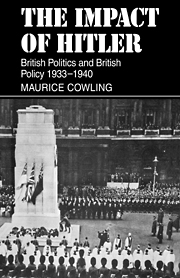Book contents
- Frontmatter
- Contents
- Preface
- Dedication
- Introduction
- PROLOGUE: THE UNFOLDING OF THE PROBLEM
- The recovery of the Labour party
- The rejection of Lloyd George
- The function of the League of Nations
- PART I THE NEW DEPARTURE
- PART II THE OPPOSITION
- PART III THE EFFECT
- PART IV THE POLITICS OF EASY VICTORY
- Conclusion
- Appendix: the actors
- Bibliography
- Notes
- Index
The function of the League of Nations
Published online by Cambridge University Press: 19 October 2009
- Frontmatter
- Contents
- Preface
- Dedication
- Introduction
- PROLOGUE: THE UNFOLDING OF THE PROBLEM
- The recovery of the Labour party
- The rejection of Lloyd George
- The function of the League of Nations
- PART I THE NEW DEPARTURE
- PART II THE OPPOSITION
- PART III THE EFFECT
- PART IV THE POLITICS OF EASY VICTORY
- Conclusion
- Appendix: the actors
- Bibliography
- Notes
- Index
Summary
‘I know that Henderson has a convention worked out and which he intends to put before the Conference when it is at its last gasp. This would not suit us at all (i) because of political reaction at home (ii) because from what little I hear his Convention would prove unacceptable to us. We should then be on the defensive, the victim and not the hero’.
Eden to Baldwin, February 24 1933‘I am glad to know that I correctly interpret your sentiments when I say that the object of the Ballot was by no means to criticise the Government…but rather to show the Government that we have a large volume of public opinion behind us in the efforts which we are today making to maintain the authority of the League of Nations…The League of Nations remains, as I said in a speech in Yorkshire, “the best sheet-anchor of British policy”.’ Baldwin, at meeting with the National Declaration Committee to present the result of the Peace Ballot and the Resolution passed at the Albert Hall on June 27, July 23 1935.
The Times, July 24‘I am bound to recognise that, if I supply the policy and the drive, S.B. does also supply something that is perhaps even more valuable in retaining the floating vote’.
Chamberlain to Hilda, November 9 1935When Foch turned the German offensive of 1918 into a rout, he destroyed the power-balance which had operated in Europe before the war. Despite a vacuum in Russia, the withdrawal of America and the balkanisation of the Danube, an Anglo-French alliance had a potentiality for dominance which it had never had before.
- Type
- Chapter
- Information
- The Impact of HitlerBritish Politics and British Policy 1933-1940, pp. 63 - 94Publisher: Cambridge University PressPrint publication year: 1975

